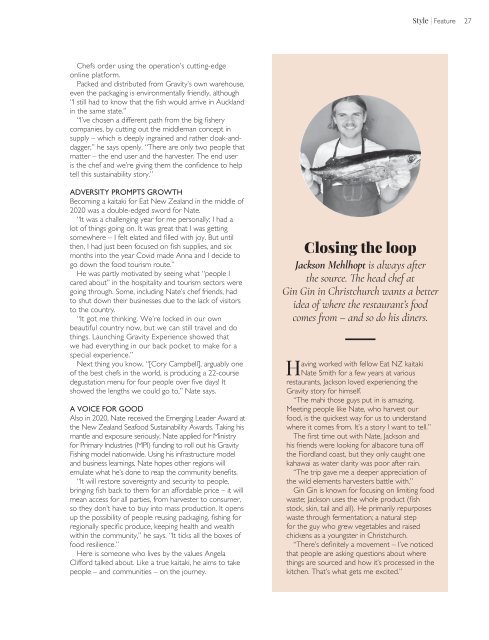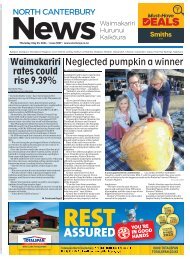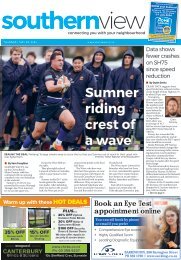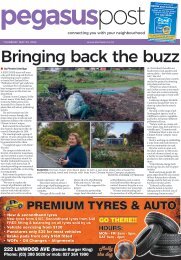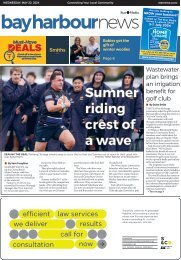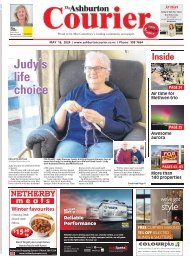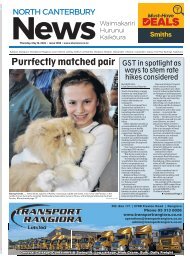Create successful ePaper yourself
Turn your PDF publications into a flip-book with our unique Google optimized e-Paper software.
<strong>Style</strong> | Feature 27<br />
Chefs order using the operation’s cutting-edge<br />
online platform.<br />
Packed and distributed from Gravity’s own warehouse,<br />
even the packaging is environmentally friendly, although<br />
“I still had to know that the fish would arrive in Auckland<br />
in the same state.”<br />
“I’ve chosen a different path from the big fishery<br />
companies, by cutting out the middleman concept in<br />
supply – which is deeply ingrained and rather cloak-anddagger,”<br />
he says openly. “There are only two people that<br />
matter – the end user and the harvester. The end user<br />
is the chef and we’re giving them the confidence to help<br />
tell this sustainability story.”<br />
ADVERSITY PROMPTS GROWTH<br />
Becoming a kaitaki for Eat New Zealand in the middle of<br />
2020 was a double-edged sword for Nate.<br />
“It was a challenging year for me personally; I had a<br />
lot of things going on. It was great that I was getting<br />
somewhere – I felt elated and filled with joy. But until<br />
then, I had just been focused on fish supplies, and six<br />
months into the year Covid made Anna and I decide to<br />
go down the food tourism route.”<br />
He was partly motivated by seeing what “people I<br />
cared about” in the hospitality and tourism sectors were<br />
going through. Some, including Nate’s chef friends, had<br />
to shut down their businesses due to the lack of visitors<br />
to the country.<br />
“It got me thinking. We’re locked in our own<br />
beautiful country now, but we can still travel and do<br />
things. Launching Gravity Experience showed that<br />
we had everything in our back pocket to make for a<br />
special experience.”<br />
Next thing you know, “[Cory Campbell], arguably one<br />
of the best chefs in the world, is producing a 22-course<br />
degustation menu for four people over five days! It<br />
showed the lengths we could go to,” Nate says.<br />
A VOICE FOR GOOD<br />
Also in 2020, Nate received the Emerging Leader Award at<br />
the New Zealand Seafood Sustainability Awards. Taking his<br />
mantle and exposure seriously, Nate applied for Ministry<br />
for Primary Industries (MPI) funding to roll out his Gravity<br />
Fishing model nationwide. Using his infrastructure model<br />
and business learnings, Nate hopes other regions will<br />
emulate what he’s done to reap the community benefits.<br />
“It will restore sovereignty and security to people,<br />
bringing fish back to them for an affordable price – it will<br />
mean access for all parties, from harvester to consumer,<br />
so they don’t have to buy into mass production. It opens<br />
up the possibility of people reusing packaging, fishing for<br />
regionally specific produce, keeping health and wealth<br />
within the community,” he says. “It ticks all the boxes of<br />
food resilience.”<br />
Here is someone who lives by the values Angela<br />
Clifford talked about. Like a true kaitaki, he aims to take<br />
people – and communities – on the journey.<br />
Closing the loop<br />
Jackson Mehlhopt is always after<br />
the source. The head chef at<br />
Gin Gin in Christchurch wants a better<br />
idea of where the restaurant’s food<br />
comes from – and so do his diners.<br />
H<br />
aving worked with fellow Eat NZ kaitaki<br />
Nate Smith for a few years at various<br />
restaurants, Jackson loved experiencing the<br />
Gravity story for himself.<br />
“The mahi those guys put in is amazing.<br />
Meeting people like Nate, who harvest our<br />
food, is the quickest way for us to understand<br />
where it comes from. It’s a story I want to tell.”<br />
The first time out with Nate, Jackson and<br />
his friends were looking for albacore tuna off<br />
the Fiordland coast, but they only caught one<br />
kahawai as water clarity was poor after rain.<br />
“The trip gave me a deeper appreciation of<br />
the wild elements harvesters battle with.”<br />
Gin Gin is known for focusing on limiting food<br />
waste; Jackson uses the whole product (fish<br />
stock, skin, tail and all). He primarily repurposes<br />
waste through fermentation; a natural step<br />
for the guy who grew vegetables and raised<br />
chickens as a youngster in Christchurch.<br />
“There’s definitely a movement – I’ve noticed<br />
that people are asking questions about where<br />
things are sourced and how it’s processed in the<br />
kitchen. That’s what gets me excited.”


